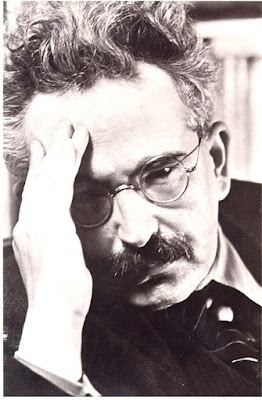
A tradição dos oprimidos nos ensina. que o "estado de exceção" em que vivemos é na verdade a regra geral. BENJAMIN
"Do you remember my sister?
How many mistakes did she make with those never
blinking eyes?
I couldn't work it out.
I swear she could read your mind, your
life, the depths of your soul at one glance.
Maybe she was stripping herself
away, saying
Here I am, this is me
I am yours and everything about me, everything you see...
If only you look hard enough
I never could.
Our life was a pillow-fight.We'd stand there on the quilt, our hands clenched
ready.
Her with her milky teeth, so late for her age, and a Stanley knife in
her hand. She sliced the tyres on my bike and I couldn't forgive her.
She went blind at the age of five. We'd stand at the bedroom window and she'd
get me to tell her what I saw.
I'd describe the houses opposite, the little
patch of grass next to the path, the gate with its rotten hinges forever wedged
open that Dad was always going to fix. She'd stand there quiet for a moment.
Ithought she was trying to develop the images in her own head. Then she'd say:
I can see little twinkly stars,
like Christmas tree lights in faraway windows.
Rings of brightly coloured rocks
floating around orange and mustard planets.
I can see huge tiger striped fishes
chasing tiny blue and yellow dashes,
all tails and fins and bubbles.
I'd look at the grey house opposite, and close the curtains.
She burned down the house when she was ten.
I was away camping with the scouts.
The fireman said she'd been smoking in bed - the old story, I thought.
The cat
and our mum died in the flames, so Dad took us to stay with our Aunt in the
country. He went back to London to find us a new house. We never saw him again.
On her thirteenth birthday she fell down the well in our Aunt's garden and
broke her head. She'd been drinking heavily.
On her recovery her sight
returned, a fluke of nature everyone said. That's when she said she'd never
blink again. I would tell her when she started at me, with her eyes wide and
watery, that they reminded me of the well she fell into. She liked this, it
made her laugh.
She moved in with a gym teacher when she was fifteen, all muscles he was. He
lost his job when it all came out, and couldn't get another one.
Not in that
kind of small town.
Everybody knew everyone else's business.
My sister would
hold her head high, though. She said she was in love. They were together for
five years until one day he lost his temper. He hit over the back of the neck
with his bullworker. She lost the use of the right side of her body. He got
three years and was out in fifteen months. We saw him a while later, he was
coaching a non-league football team in a Cornwall seaside town. I don't think
he recognized her.
My sister had put on a lot of weight from being in a chair
all the time. She'd get me to stick pins and stub out cigarettes in her right
hand. She'd laugh like mad because it didn't hurt. Her left hand was pretty
good though. We'd have arm wrestling matches, I'd have to use both arms and
she'd still beat me.
We buried her when she was 32. Me and my Aunt, the vicar, and the man who dug
the hole. She said she didn't want to be cremated and wanted a cheap coffin so
the worms could get to her quickly. She said she liked the idea of it, though
I
thought it was because of what happened to the cat, and our mum".
Tindersticks My Sister lyrics





"Para maior clareza, coloco em primeiro plano a forma fotográfica dessa técnica. O que for válido para ela pode ser transposto para a forma literária. Ambas devem seu ímpeto excepcional à técnica da publicação: o rádio e a imprensa ilustrada. Pense-se no dadaísmo. A força revolucionária do dadaísmo estava em sua capacidade de submeter a arte à prova da autenticidade. Os autores compunham naturezas mortas com auxilio de bilhetes, carretéis e pontas de cigarro aos quais se associavam elementos pictórios. O conjunto era posto numa moldura. O objeto era então mostrado ao público: vejam, a moldura faz explodir o tempo; o menor fragmento da vida diária diz mais que a pintura. Do mesmo modo a impressão digital ensangüentada de um assassino, na pagina de um livro diz mais que o texto. A fotomontagem preservou muitos desses conteúdos revolucionários. Basta pensar nos trabalhos de John Heartfield, cuja técnicatransformou as capasa dos livros em instrumentos políticos. Mas acompanhemos um pouco mais longe a trajetória da fotografia. Que vemos? Ela se torna cada vez mais matizada, cada vez mais moderna, e o resultado é que ela não pode maisfotografar cortiços ou montes de lixo sem transfigurá-los. Ela não pode dizer, de uma barragem ou de uma fábrica de cabos, outra coisa senão: o mundo é belo.este é o título do conhecido livro de imagens de Renger-Patsch, que representa a fotografia da 'Nova Objetividade' em seu apogeu. Em outras palavras ela conseguiu transformar a própria miséria em objeto de fruição, ao captá-la segundo os modismos amis aperfeiçoados. Por que se uma das funções econômicas da fotografia é alimentar as massas com certos conteúdos que antes ela estava proibida de consumir – a primavera, personalidades eminentes, países estrangeiros – através de uma elaboração baseada na moda, uma das suas funções políticas é a de renovar, de dentro, o mundo como ele é – em outras palavras, segundo os critérios da moda".
BENJAMIN






